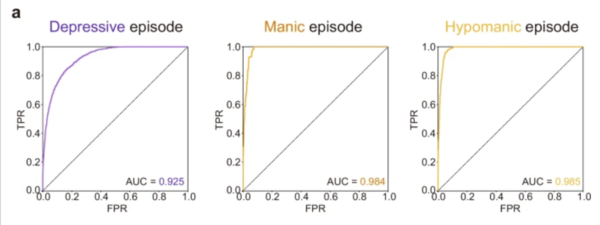Jet lag from long flights or shifts in daylight hours due to seasonal changes can trigger relapses in individuals with mood disorders. Yet, current predictive models often rely on extensive data, such as step counts, heart rates, and global positioning system (GPS) sensor-based activity, making them impractical for everyday use.
A team of Korean researchers has introduced a model that simplifies this process by using only sleep-wake patterns—specifically, sleep duration and wakefulness—to predict mood episodes. This innovation leverages data collected from widely available commercial devices like smartphones and wearables.
The model, developed by Kim Jae-kyoung, chief investigator of the Biomedical Mathematics Group at the Institute for Basic Science (IBS) and professor of mathematical sciences at Korea Advanced Institute of Science & Technology (KAIST), in collaboration with Professor Lee Heon-jeong of psychiatry at Anam Hospital, was trained on extensive data from 168 individuals with mood disorders. Over an average period of 429 days per participant, their sleep-wake patterns and mood episodes were analyzed using machine learning.

The technology, detailed in a study published last Monday in NPJ Digital Medicine, uses machine learning to analyze an individual’s sleep-wake history and past mood episodes, achieving predictive accuracies of 80 percent for depressive episodes, 98 percent for manic episodes, and 95 percent for hypomanic episodes, respectively.
“By developing a model that relies solely on sleep-wake data, we’ve reduced data collection costs and enhanced clinical applicability,” said Professor Kim. “This could lead to cost-effective diagnostic and therapeutic options for patients with mood disorders.”
Sleep and activity disruptions are commonly observed in individuals with mood disorders such as major depressive disorder and bipolar disorder. To investigate these patterns, Professor Kim and his team collected sleep-wake data from 168 patients over an average of 429 days per person. Sensors in smartphones and wearables, including accelerometers, GPS, and light sensors, allowed for passive, real-world data collection. Most participants were undergoing treatment for their mood disorders during the study.
Using this dataset, the researchers extracted 36 indicators related to sleep-wake cycles and biological rhythms, which were analyzed through a machine learning algorithm. The study identified variations in circadian rhythms as a key factor in predicting mood episodes. Most notably, delayed circadian rhythms were linked to an increased risk of depressive episodes, while excessively advanced rhythms were associated with manic episodes.

“For example, an individual with a regular sleep schedule of 11 PM to 7 AM might face a higher risk of depression if their sleep pattern shifted later,” Professor Kim said. The findings also highlight the potential for personalized treatments. “In clinical practice, bright light therapy in the early morning is often used to treat seasonal affective disorder.”
The study underscores the importance of objective mood data, moving beyond subjective self-reporting. “This research provides a framework for collecting objective indicators using non-invasive wearable devices,” Professor Kim added.
Looking ahead, Professor Lee, who served as a co-corresponding author for the study, suggested that digital therapeutics could allow patients to proactively manage their mood disorders through personalized recommendations delivered via smartphone apps.
Related articles
- The greater the grit, the better the sleep: study
- Researchers develop eye-implantable sensor and smartphone tech for early Alzheimer's diagnosis
- Half of sleep disorder treatments were made on people over 60
- How a culture of sleepless success in Korea impacts health and society
- Long-term use of REM sleep behavior disorder drug does not affect cognition
- Blood vessels found to be key to cardiovascular disease: study
- Starting next January, medical bills for depression diagnosis will be covered

